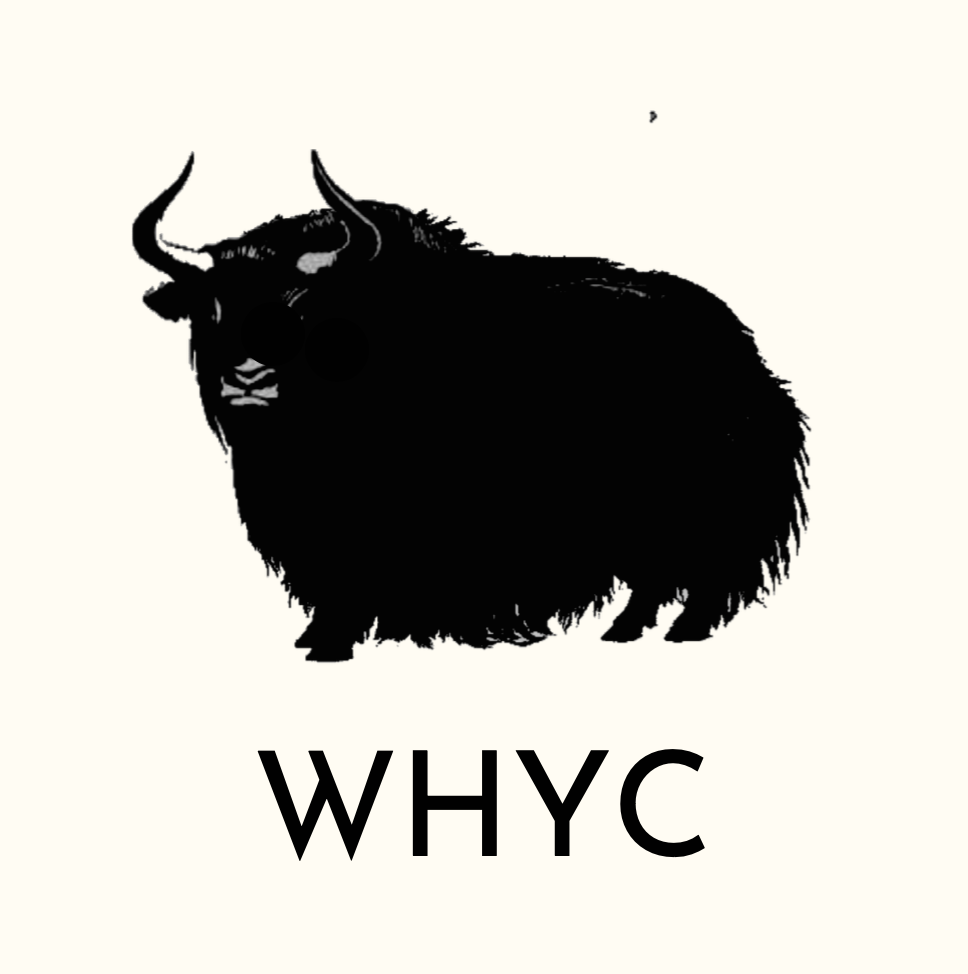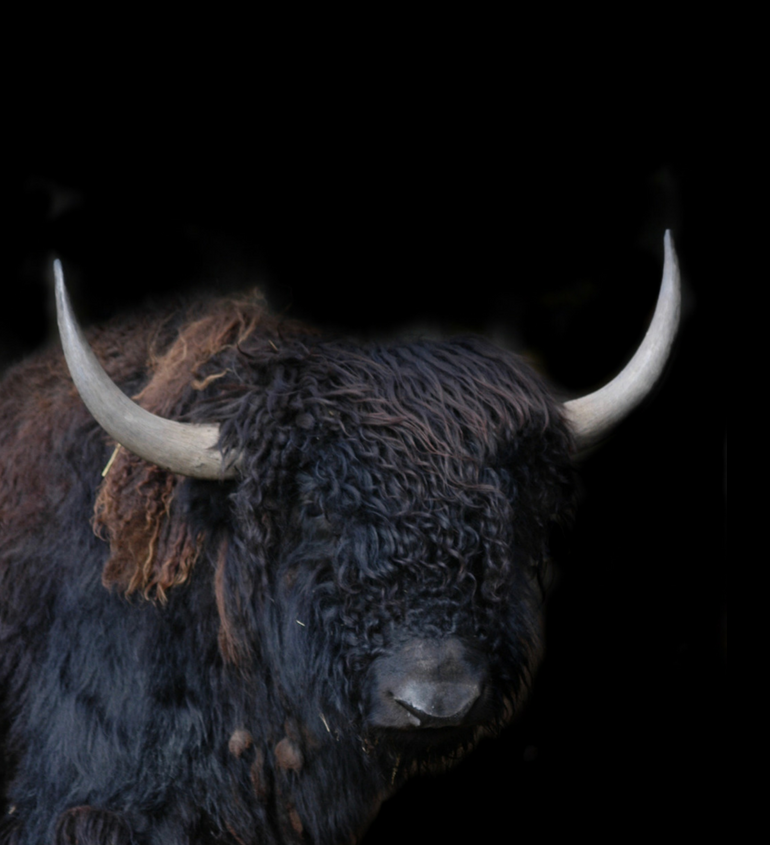THE YAK ADVANTAGE
10 REASONS FOR LOVING YAK
There are several key reasons why raising Heritage Yak is more profitable and desirable than cattle or bison. Heritage Yak are a rare and endangered breed of National Significance and in need of preservation, and deserving our conservation efforts. North American Heritage Yak are important to biological diversity and species preservation. Yak are also of value to high-end fiber producers, dairy farmers, and meat ranchers. Heritage Yak for a Greener Planet.
1. They Do It on Their Own
Yak don’t need assisted births like cattle and sheep so often do. Many factory and Big Ag breeds have become so over-engineered for large size that they no longer have the ability to birth naturally, unassisted by humans. No so with Heritage Yak. They do it on their own.
Thanks to our friends at A Yak Or 2 Ranch
2. Yak have Charming Personality
A yak charming? I can’t say enough about this point! If you’ve never met a smart, friendly, interesting yak - you must. Joyful, Cheerful, Intelligent and Sociable. You will fall in love.
3. Yak Are Eco-Friendly
Yak are easy on the earth and beneficial to the planet. You can run two to three times more yak on the same amount of pasture as compared to cattle. They are restorative to the land, contributing fertilizer and taking fewer resources, and as a Bison replacement they turn the soil and stimulate many endangered seeds to grow (eg. lupin). Yak are very Eco-friendly.
4. Yak are Hearty
Yak are hardy, cold tolerant, and long lived. We have found yaks tend to prefer grass hay, or an alfalfa-grass mix, and don't require grain, which also cuts down on feed costs.
The original importation of yak to North America was motivated by the effort to introduce a meat stock that had the advantages of being a heartier and cold tolerant breed.
This does not mean we neglect them. Indeed, we supplement with protein tubs, mineral blocks and grain, but we acknowledge the conservation of resources afforded by this species - green yak.
5. Yak Fiber is Exceptional
There is also a greatly underutilized potential in North American Yak. Ranchers could benefit from the luxury fiber that yak produce. Clothing made from yak wool is highly valued in Europe. Yak down is a very high-quality product that is in high demand by fiberists and textile fans. The retail price for raw yak rovings is roughly $6 per oz, and wholesale is closer to $3.50 to $4.00 per oz (60 to 93$ per lb). The average yak will yield around 1-2 lbs (500-1000gm) of fiber per year. If you have the fiber cleaned and spun, or participate in an WHYC fiber co-op, one yak will make about 5-10 skeins (100gm each). So, at $25-35/skein, each yak can earn a very nice supplemental income (on average $300 per year). If you mix it with less expensive sheep fiber, you can improve the price for 50/50 skeins. If you have the skill or higher someone to weave or crochet, these become valuable end products it can be lucrative (view Khunu for more detailed information).
Enjoy our partners and friends at Khunu.
6. Yak Dairy is Healthy
Yak dairy is exceptionally rare, but there is some exceptional, awarding winning yak cheese available in the US. Yak produce high-value Natural Concentrated milk (~ 1,100 lbs per year) which is of high value to cheese makers. Yak cheese is supported by the health-driven, exotic dairy market as well, offering a heart healthy dairy alternative to traditional dairy (e.g. higher protein, higher Omega 3s, more good cholesterol, optimized for the Keto diet, etc.). Heritage Yak cheese is excellent and award winning, subtle and wonderful.
Thank you Prairie Sky
7. Heritage Yak Meat is Healthy
Yak is a heart-healthy meat that is lean and high in Omega 3s. The American market has responded with enthusiasm to yak. North American Yak meat has grown in demand over the years and continues claim top dollar prices, out preforming grass-fed, organic beef and bison. Breeders regularly struggle to meet demand and sell out their yak products before they become available. Currently, many new community members are entering yak ranching, attracted by these monetary advantages (e.g. high stocking capability, low forage quality requirements, and high meat value).
Heritage Yak meat is in very limited supply, and it demonstrate a premium price. Yak meat prices are considerably higher than cattle meat, and recently have been about one and a half times higher than beef prices. Yak is still something of an unknown to most consumers, but it is similar to bison, with very lean meat and a flavor profile very similar to beef. Yak have been well established in Colorado, and consumers are willing to pay for quality meat. There is an existing market for yaks and yak meat. Yak will always be a niche product, and will command a significantly higher price than regular beef. Not competing with BigAg is a huge advantage to anyone in the business of herding.
8. Yak have high Trainability
Yak are highly trainable. Intelligence is a major component in a animal’s ability to learn, each breed has its own distinct personality, instinctive drives, and genetic heritage, which will affect trainability. For example, yaks were developed to work cooperatively with their human partners as pack animals by mountianeers, but they were also cultivated over centuries to help nomads move their homes between summer and winter camps twice a year.
9. Heritage Yak have high Genetic Purity
Yak are not susceptible to the multitude of genetic disease and biological issues caused by human engineering. By preserving yak we preserve important genetic diversity for future generations, at a time when 1000s of species go extinct and disappear from the planet each year.
10. Good For the Planet
Because Biodiversity. There is also much research supporting the ability of yak to mitigate Climate Change (e.g. lower methane emissions, lower stocking rates, prairie bison replacement, etc.). For these reasons, yak are considered environmentally green and carbon neutral, and in many cases can be Carbon Negative due to their support of carbon capture. Big deal. #yakdontfart #yakgreen
If you are interested in helping to preserve the Heritage Yak breed for the future generations, and end domestic extinction, please Become a member and Adopt A Yak.
To learn if your yak qualifies as a Heritage Yak breed, or to be put in contact with a Heritage Yak breeder, please contact our Registrar, Brad Salvato, at info@heritageyak.com.






